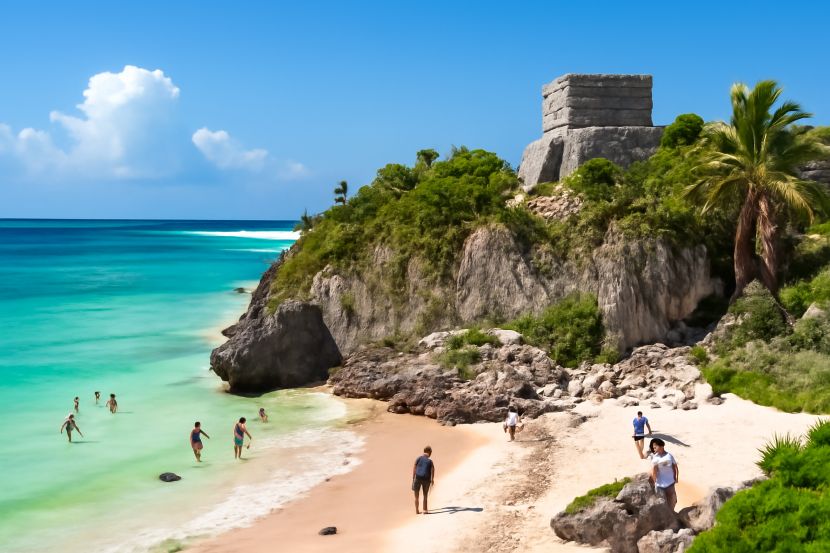Published on
October 3, 2025

In a major development for both residents and visitors, the Tulum Tourism Commission has approved a new reform proposal aimed at ensuring “free, permanent, and unrestricted” access to the region’s beaches. This proposal, which focuses on the General Laws on National Assets and Ecological Balance and green initiatives, received strong backing from Congress on October 2, 2025. It is part of an effort to prevent the privatization of natural resources and to guarantee public access to Mexico’s treasured coastlines.
The new proposal was first pitched by Ricardo Monreal Ávila, the President of the Political Coordination Board and Coordinator of Morena, who asked the Tourism Commission to support the initiative. His proposal aims to modify existing laws to solidify free public access to beaches and Protected Natural Areas (ANPs), with a key focus on areas like Tulum, which has experienced challenges with restricted beach access.
Monreal emphasized the critical importance of preserving public rights to Mexico’s beaches and protected areas. He pointed out that free access to these spaces was not just a matter of public policy but a fundamental human right. He stated that free access to beaches was tied to equality, freedom of movement, and the right to enjoy a healthy environment. He also warned against the trend of indirect privatization of natural heritage, particularly through private developments that close off access or impose entry fees.
The proposed reform is designed to harmonize environmental conservation efforts with public rights. By preventing private entities from restricting beach access, the law would ensure that beaches and protected natural areas remain open and accessible to all Mexicans and visitors, regardless of their financial means.
Support for Ecological Protection and Funding
Monreal also acknowledged the current budget issues facing many Áreas Naturales Protegidas (ANPs), which have sometimes been forced to charge entrance fees due to limited government funding. To address this concern, he proposed reallocating 500 million pesos during upcoming budget discussions to ensure ANPs can continue to operate without compromising access rights.
Monreal stated that protecting nature was about more than just conservation; it was about safeguarding people’s right to enjoy it. He emphasized that the state must ensure its citizens can access and enjoy these spaces freely and that prioritizing funding for their preservation was crucial.
The reform proposal was presented as a joint effort between Monreal and Representative Enrique Vázquez Navarro, with support from lawmakers across various states, including Chiapas, Jalisco, Veracruz, Sinaloa, Sonora, and Quintana Roo. Monreal also submitted a technical document to the committee, which provided a detailed rationale for the changes, further solidifying the case for public access to natural areas.
Legislative Timeline and Future Steps
In the coming weeks, the proposal will be discussed with the goal of defining clear guidelines to regulate how charges for access to protected areas can be managed. This is particularly relevant to areas like Tulum, where the government is looking to balance tourism development with conservation.
One of the more notable mentions in Monreal’s speech was Tulum’s Jaguar Park, where private operators have been criticized for imposing high entry fees. Monreal argued that Mexico’s natural wealth should be accessible to everyone, not just those able to pay disproportionately high fees. His remarks underscored a broader concern over how natural areas are managed and financed in popular tourist destinations.
While the reform’s approval in the Tourism Commission marks a significant victory, further discussions are set to take place in the near future. The proposed reforms are expected to be fully examined by Congress before the upcoming World Cup, with the intention of updating the law to better regulate access to protected natural areas.
Tulum Mayor Celebrates the Reform
Tulum’s Mayor Diego Castañón Trejo expressed his appreciation for the proposal’s passage and the social and cultural value of keeping Tulum’s beaches open for the public. In his words, “beaches are an element of our identity and the community, and the identity of the community, they are for everyone.” He further mentioned that the ‘one-step’ achievement of ‘securing’ open, clean, and safe beaches serves the purpose of ‘all’ the visitors and residents of Tulum.
The mayor’s gratitude also extended to the other actors involved in the reform, such as Ricardo Monreal, Enrique Vázquez, Governor Mara Lezama, and Senator Eugenio Segura Vázquez, for their efforts to make this transformation possible. He stated that ‘the most difficult work’ of securing unrestricted access to beaches has only just begun, but he stated that this reform stands as an indicator of the ‘shifting of the lens’ to the people.
Castañón expressed that this accomplishment would not have been possible without ‘the support of the people.’ With this, he stated that they would continue to prove that ‘real transformation’ commences once the needs of the community are placed above the economic gain. His last words stressed the commitment of Tulum’s city council to keeping ‘the beaches of Tulum open, safe, and free accessible to everyone.’
For Tulum and the rest of Mexico’s coastal regions, this reform balances unregulated development with coastal development restrictions. Allowing residents and visitors to enjoy the country’s gorgeous natural landscapes helps promote Tulum and Mexico’s coastal tourism sectors. It puts access and tourism development in the context of Mexico’s various tourist destinations. Maintaining Tulum’s natural beauty and promoting its natural landscape tourism opportunities aids in Mexico’s natural tourism growth. This reform highlights the work of local officials and lawmakers to promote tourism and to guarantee its unregulated development.







